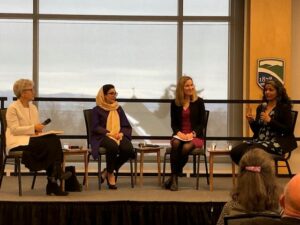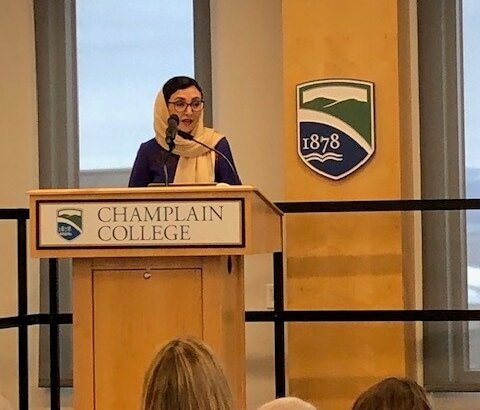The issues that women face in Afghanistan are man-made and are reversible. That was the message from Ambassador Adela Raz, the keynote speaker and a panelist at Thursday’s International Women’s Day event, “The Importance and Impact of Women at the Forefront of Change.” Raz, who served as the last Ambassador of Afghanistan to the U.S., shared the Afghani saying about the river as inspiration.
“If I had been talking to you in March 2020, I would have been talking about how women can make the change,” she said. “The fight will go on, the struggle will move, the voices will go even louder until we reach our goal. We must build strong sisterhood, deeper alliance and a louder voice.”
She knows this firsthand. Growing up in Afghanistan under Taliban rule 25 years ago, Raz was barred from education (as women there are today). Every night she went to bed she hoped for them to go away. After five years, the Taliban were ousted, and schools opened once again to girls and women. Raz wasted no time and seized on the opportunity, eventually becoming not only the last ambassador to the U.S. – a distinction that vexes her – but also serving as the Afghani ambassador to the United Nations as the first woman to hold the office of Permanent Representative of Afghanistan to the U.N. She previously served as the first female Deputy Spokesperson and Director of Communications for President Hamid Karzai. Today, she is the director of the Afghanistan Policy Lab at Princeton University, where she has interviewed Afghani women who are working to make change for women.
At the Vermont Council on World Affairs’ (VCWA) Thursday event, which National Life Group sponsored, Raz joined other powerful women glass-ceiling-busters at a program held at Champlain College. The Honorable Denise Johnson, Vermont’s first female Supreme Court justice, moderated a panel discussion that included Attorney General Charity Clark, Vermont’s first female AG, and entrepreneur Akshata Nayak, along with Raz.
They all agreed that while western women have enjoyed big gains in access to education, careers and independence, there is still much work to be done not only in Afghanistan, Ukraine or Iran, but here in Vermont, in the U.S., as well.
The discussion addressed the importance of mentors, and the impact of incremental change. Clark, for instance, within two months of taking office has installed a lactation room in the Office of the Attorney General. Nayak, who out of necessity to teach her own daughter her native Indian language (as well as her husband), writes children’s books to promote that learning. She talked about the power of story-telling. The panelists all agreed that the path to empowering women lies with education, childcare and sharing stories.
“Stand up, take up space. It gives other women their voice to do the same. If you want women to be agents of change, you need to make space for their stories,” she said.
Raz minced no words: “I say, let’s be biased, who cares. Just help other women; just blindly do it.”

